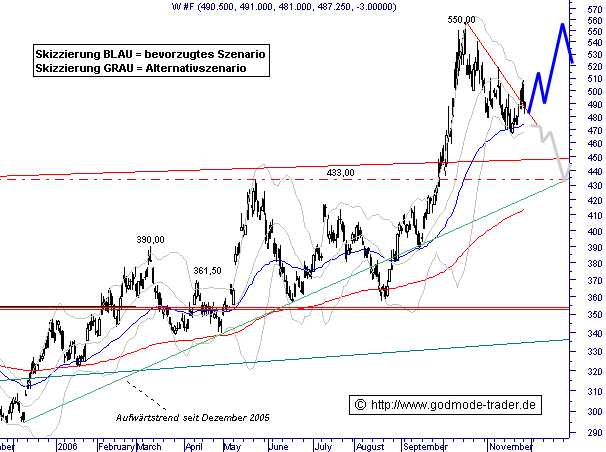Wheat Rises to Record in Paris; Russia May Curb Grain Exports
By Marianne Stigset and Maria Kolesnikova
Enlarge Image/Details
Sept. 3 (Bloomberg) -- Wheat rose to a record in Paris as traders speculated that Russia, the world's fourth-largest exporter of the grain, may curb shipments to restrain domestic food prices.
Russia has created a ``working group'' to propose measures, Sergei Shakhovets, head of information and analytics at the Russian Grain Union, said by phone from Moscow today. The proposals may include sales from state inventories and export duties and quotas, he said. Kazakhstan today also said it plans to introduce licenses for grain exports.
The market's anticipation of ``export licenses on wheat in Russia and Kazakhstan, is a big factor'' for prices, Sorin Vasloban, a grains and oilseeds trader at brokerage Plantureux SA, said by phone from Paris today.
Global wheat stockpiles in the year ending June 2008 will drop to their lowest in more than a quarter of a century, according to the London-based International Grains Council. Supplies have been hurt by drought in Ukraine, Europe and Canada, according to the council.
Wheat for November delivery on the Euronext.liffe exchange gained 8.50 euros, or 3.3 percent, to 265.50 euros ($362) a ton at 3:31 p.m. in Paris. Prices for the contract closest to delivery have gained 70 percent this year. Wheat futures fell 1.2 percent on the Chicago Board of Trade on Aug. 31 on concern that the surge in prices may discourage speculators from taking new positions.
Russian Drought
Drought in Russia's main wheat-producing regions of Rostov, Volgograd and Orenburg may cut production by 3.2 percent to 44.3 million metric tons this year, according to the U.S. Department of Agriculture. Year-end inventories may drop to a five-year low of 2 million tons, the department said in an Aug. 21 report.
The USDA forecast a 3.8 percent decline in Russian wheat exports, to 10.1 million tons. Russian President Vladimir Putin has to step down next year.
``The election year in Russia makes government policy, including possible tariff or quota regulation of grain exports, less predictable than ever,'' the USDA said in its report.
The Russian ``working group'' will propose measures by the middle of this month, including possible export restrictions, an agriculture ministry spokeswoman said by phone today, declining to be identified by name because of ministerial rules.
Kazakhstan, the third-largest grain producer in the former Soviet Union, today said it plans to introduce licenses for grain exports to reduce speculative trading. Overall export volumes should be little changed as a result this year, Sergei Kuyanov, a spokesman for the agriculture ministry in Astana, said by phone.
Ukraine Restrictions
Ukraine, the world's eighth-biggest wheat exporter, is already restricting exports after drought cut its grain harvest to 30 million tons, its smallest since 2003, according to the Agricultural Ministry. The country will ship 58 percent less grain this year, the ministry said Aug. 29.
Global wheat stockpiles for the year ending June 2008 will be 111 million tons, the International Grains Council forecast last month.
That's spurred more buying by importers such as Egypt, the world's biggest buyer after Brazil. Egypt bought 10 times more wheat last month than it did a year earlier, in anticipation of higher prices, according to the country's General Authority for Supply Commodities.
``We will not stop buying wheat because we want to make sure we fulfill our needs,'' said Nomani Nomani, undersecretary of trade and deputy chairman of Egypt's main state grain buyer, the General Authority for Supply Commodities. ``We have imported a huge amount in the past couple of months to make sure we are not controlled by the futures market.''
Milling Group
Italy's biggest milling group, Grandi Molini Italiani SpA, said last week it would raise flour prices by more than 50 percent by the end of the year, Reuters reported Aug. 31. Italian consumer groups are organizing a nationwide boycott of pasta on Sept. 13, in protest against price gains, Reuters said.
U.S. wheat prices also declined on Aug. 31 on speculation the world's farmers will increase wheat plantings in response to record prices, after global production failed to keep pace with demand for seven of the past eight years.
The last time prices rose to a record, in 1996, farmers increased planted acreage by 5.2 percent in the 1996-1997 marketing year, boosting global production by 8.3 percent to 582.6 million metric tons, USDA data show.
The U.S. is the world's biggest wheat exporter, followed by Canada and Australia, according to the USDA.
To contact the reporters on this story: Marianne Stigset in London at mstigset@bloomberg.net ; Maria Kolesnikova in Moscow at mkolesnikova@bloomberg.net . |


 Thread abonnieren
Thread abonnieren




